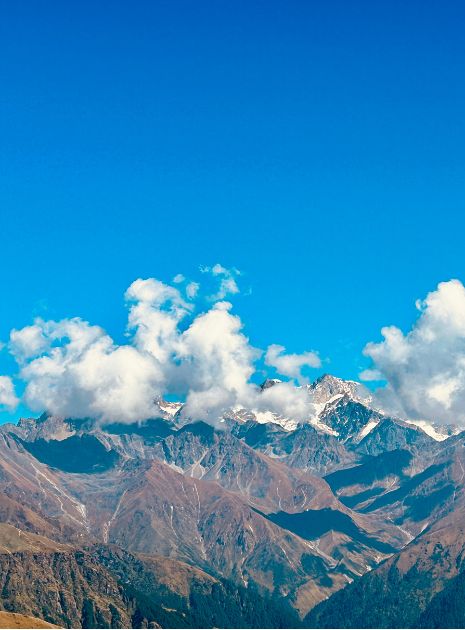Sankri
You don’t stumble on Sankri. You reach it after hours of turning roads. The Tons River (टॉन्स नदी) is always closed, and pine trees press in from both sides. Then the road stops. Beyond that, only trails. And right there, leaning against the hills, Sankri waits quietly.
You don’t stumble on Sankri. You reach it after hours of turning roads. The Tons River (टॉन्स नदी) is always closed, and pine trees press in from both sides. Then the road stops. Beyond that, only trails. And right there, leaning against the hills, Sankri waits quietly.
It sits at nearly 1,900 meters in Uttarkashi. On paper, just another Himalayan village. In person, something else entirely.
Census lines will tell you Sankri is part of Mori tehsil. A few hundred families, land spread across some 40 hectares, wooden houses, slate roofs. That’s what the data says.
But walk the lanes, and the real Sankri appears. A boy racing his goat down a slope. A woman carrying a bundle of oak leaves tied with rope, heavier than she looks. Smoke curling from a chulha, sharp with pinewood. A shopkeeper shouts the price of sugar. These things don’t make it to reports, but they’re the texture of life here.
Morning doesn’t rush. Mist takes its time lifting. Somewhere, a rooster. Dogs stretch out on the path, refusing to move. Brass pots clink as women fetch water. Someone’s radio plays faint Garhwali (गढ़वाली) songs. Trekkers gather near tea stalls, clutching glasses, boots unlaced.
The afternoon is heavy. The sun on the stone makes the village too bright. People vanish indoors. Fields are still alive, though farmers bent over wheat or potatoes, oxen trudging uphill. Only cicadas seem busy in the village itself.
By evening, Sankri stirs again. The temple bell rings, answered by the azaan (अज़ान) from down the slope. Kids shout as they chase a cricket ball. Men argue over who will fetch salt from the shop. Women sit together, husking corn and trading news. Trekkers limp back, tired but grinning, mud on their trousers.
Night falls quietly. Sometimes the electricity stays, sometimes it doesn’t. When it cuts, lanterns glow. The sky soaked in stars feels too wide to name. Voices fade into courtyards, a cow coughs somewhere, and the river below doesn’t stop talking.
The village is small, but it’s guarded by giants. Swargarohini, Black Peak, Bandarpoonch they show up in the skyline like old gods. Snow caps catch the orange light at sunrise, then fade to shadow by noon.
Sankri itself is wrapped by the Govind Pashu Vihar forest. Deodar trees taller than you’d believe, air spiced with resin. If you sit still, you’ll hear monkeys screeching, birds cracking through leaves, and sometimes only silence, which is heavier than sound.
Most outsiders know Sankri as a starting point. Kedarkantha, Har Ki Dun, Bali Pass, Ruinsara Tal all the big treks begin here.
You’ll see trekkers fumbling with gear, haggling for jackets, stuffing their rucksacks. But what they remember later isn’t just the trails. It’s the warm chai someone pressed into their hands. The rotis made from mandua flour at a homestay. The way local dogs walked ahead of them on the first stretch, as if they owned the route.
Markets speak Hindi. Trekkers sometimes toss in English. But inside homes, Garhwali (गढ़वाली) holds the floor. It’s in the lullabies, in the teasing of children, in old men cursing the weather.
Words here carry weight. “Bas, ho gya” (enough, it’s done) muttered at dusk in the fields. Or a quick “Chal, aaja” (come on, let’s go) called down an alley. They don’t need translation. The sound is enough.
Festivals fold Sankri into color.
On Diwali (दीवाली), lamps glow on every balcony. The slate roofs reflect little points of fire against the dark.
During Holi (होली), colors blur the lines between children, walls, and even dogs. Everyone laughs until the valley carries it back.
In Navratri (नवरात्रि), the small mela (मेला) sets up. Pakoras fry in big iron pans, dhol beats echo off the trees, and bangles clink on women’s wrists as they shop.
Temples aren’t large here. A single room, a bell, a handful of flowers. But when the bells ring, even the forest seems to bow its head.
Life in Sankri isn’t simple. Roads break during the monsoon. Landslides leave the village cut off for days. Hospitals are far. Farming barely keeps families afloat. Young men leave for Dehradun, Delhi, and even further. Women keep homes steady. Elders manage fields until someone comes back.
Yet no one cuts ties. Migrants return during Holi and, during Diwali. Houses light up again. Empty fields see footsteps. It’s a cycle absence and return that keeps the village alive.
Sit on a roof here at dusk, and it’ll stay with you. Smoke is rising slowly. Stars blinking on, too many to count. Laughter from a corner of the lane. A cow shifting in the dark. And always the Tons river, whispering at the edge of hearing.
Sankri doesn’t perform for visitors. It doesn’t polish itself. That’s its charm. You don’t just see it you feel its weight, its quiet, and it leaves something in your chest that follows you down the road when you leave.
By Road: About 200 km from Dehradun. The road winds through Purola and Mori, sometimes narrow, sometimes breathtaking. Shared jeeps and buses go the distance.
By Train: Dehradun is the nearest railway station. From there, buses or taxis make the long drive uphill.
By Air: Jolly Grant Airport near Dehradun is the closest. After that, it’s wheels on mountain roads.

Uttarakhand is not simply another country. People here name it Devbhoomi (देवभूमि), the Land of the Gods. And it feels that way. Rivers begin right he......
See Details